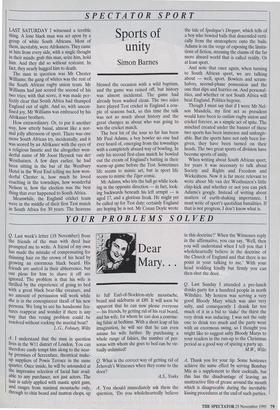SPECTATOR SPORT
Sports of unity
Simon Barnes
LAST SATURDAY I witnessed a terrible thing. A lone black man was set upon by a group of white South Africans. Most of them, inevitably, were Afrikaners. They came at him from every side, with a single thought in their minds: grab this man, seize him, hold him. And they did so without restraint. In fact, they nearly hugged him to death.
The man in question was Mr Chester Williams; the gang of whites was the rest of the South African rugby union team. Mr Williams had just scored the second of his two tries; with that score, it was made per- fectly clear that South Africa had thumped England out of sight. And so, with uncon- fined joy, Mr Williams was embraced by his Afrikaner brothers.
How extraordinary. Or, to put it another way, how utterly banal, almost like a nor- mal jolly afternoon of sport. There was one more South African try, incidentally, and it was scored by an Afrikaner with the eyes of a religious fanatic and the altogether won- derful name of Mr Joost Heystek van der Westhuizen. A few days earlier, he had been sitting in the bar of the Westbury Hotel in the West End telling me how won- derful Chester is, how much he loved coaching in the townships, how wonderful Nelson is, how the election was the best thing that ever happened to South Africa.
Meanwhile, the England cricket team were in the middle of their first Test match in South Africa for 30 years. The heavens blessed the occasion with a wild baptism, and the game was rained off, but history was almost incidental. The game had already been washed clean. The two sides have played Test cricket in England a cou- ple of seasons back, so this time the talk was not so much about history and the great changes as about who was going to win the cricket match.
The best bit of the tour so far has been Mr Paul Adams, a boy bowler no one had ever heard of, emerging from the townships with a completely absurd way of bowling. In only his second first-class match he bowled out the cream of England's batting in their warm-up game before the Test. Sometimes life seems to mimic art, but in sport life seems to mimic the Tiger comic.
Mr Adams, who lets the ball go while look- ing in the opposite direction — in fact, look- ing backwards beneath his left armpit — is aged 17, and a glorious freak. He might yet be called up for Test duty; certainly England are hoping he is not. Mr Conan Doyle wrote the tale of Spedegue's Dropper, which tells of a boy who bowled balls that descended verti- cally from the stratosphere onto the bails. Adams is on the verge of exposing the limita- tions of fiction, stressing the claims of the far more absurd world that is called reality. Or at least sport.
And note that once again, when turning to South African sport, we are talking about — well, sport. Bowlers and scrum- halves, second-phase possession and the one that dips and hurries on. And personal- ities, and whether or not South Africa will beat England. Politics begone.
Though I must say that if I were Mr Nel- son Mandela, my first act as president would have been to outlaw rugby union and cricket forever, as a simple act of spite. The mischief created under the banner of these two sports has been immense and unforgiv- able. But the sports have not only been for- given, they have been turned on their heads. The two great sports of division have become sports of unity.
When writing about South African sport, for years it was necessary to talk about Society and Rights and Freedom and Wickedness. Now it is far more relevant to write about Mr van der Westhuizen's little chip-kick and whether or not you can pick Adams's googly. Instead of writing about matters of earth-shaking importance, I must write of sport's quotidian banalities. If that is not progress, I don't know what is.


















































































 Previous page
Previous page